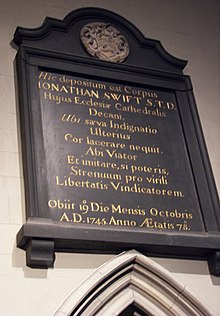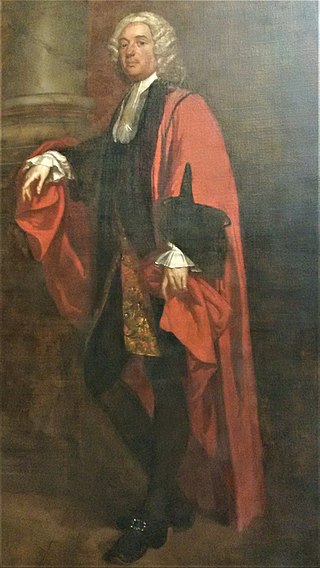Contents
This article relies largely or entirely on a single source .(May 2018) |
| |||||
| Centuries: | |||||
|---|---|---|---|---|---|
| Decades: | |||||
| See also: | Other events of 1745 List of years in Ireland | ||||

Events from the year 1745 in Ireland.
This article relies largely or entirely on a single source .(May 2018) |
| |||||
| Centuries: | |||||
|---|---|---|---|---|---|
| Decades: | |||||
| See also: | Other events of 1745 List of years in Ireland | ||||

Events from the year 1745 in Ireland.

Jonathan Swift was an Anglo-Irish writer who became Dean of St Patrick's Cathedral, Dublin, hence his common sobriquet, "Dean Swift".
This article contains information about the literary events and publications of 1745.

Hugh Annesley, 5th Earl Annesley was a British military officer and Member of Parliament for County Cavan from 1857 to 1874.
Jonathan Smedley (1671–1729) was an Anglo-Irish churchman who became Dean of Clogher in 1724. He was an opportunist and satirical victim who engaged in a polemic with Jonathan Swift and the forces of the Tory party.
Nationality words link to articles with information on the nation's poetry or literature.
Events from the year 1824 in Ireland.
Events from the year 1831 in Ireland.
Events from the year 1694 in Ireland.
Events from the year 1686 in Ireland.
Events from the year 1729 in Ireland.
The Lord High Treasurer of Ireland was the head of the Exchequer of Ireland, and chief financial officer of the Kingdom of Ireland. The designation High was added in 1695.
Events from the year 1757 in Ireland.
Thomas Marlay was an Irish politician and judge, who ended his career as Lord Chief Justice of Ireland. He is remembered chiefly for beginning the rebuilding of Celbridge Abbey, and as the grandfather of the statesman Henry Grattan.
Robert Marshall (c.1695–1774) was an Irish judge. He is remembered chiefly as co-executor and legatee of Esther Vanhomrigh, the beloved "Vanessa" of Jonathan Swift, although he was not a close friend of hers; indeed it is possible that they never met.

John Sterne (1660–1745) was an Irish Church of Ireland clergyman, bishop of Dromore from 1713 and then bishop of Clogher from 1717.
Robert Saunders (c.1650–1708) was an Irish landowner, barrister and politician. He sat in the Irish House of Commons as MP for Cavan, and was the Irish Prime Serjeant-at-law. Unusually, his youngest son, Morley Saunders, also held the office of Prime Serjeant. Robert was one of the founders of the village of Swanlinbar, County Cavan, which is partially named after him, according to Jonathan Swift, who states that "an" represents the "aund" in "Saunders".
Thomas Bladen was an Anglo-Irish priest in the seventeenth century. The eldest son and heir of William Bladen of Newton Solney in South Derbyshire and Mary Young, his family left London in 1626 where they had a printing/bookselling business at St Paul's Churchyard to live amongst Protestant settlers in Dublin.

Eaton Stannard (1685–1755) was a leading politician and lawyer in 18th-century Ireland. He was a popular Recorder of Dublin, a very unpopular serjeant-at-law (Ireland), and an experienced parliamentarian who represented Midleton in the Irish House of Commons for many years. He is mainly remembered now as a close friend of Jonathan Swift, whose last known letter was written to him.
The House That Swift Built is a 1982 Soviet fantasy comedy-drama film directed by Mark Zakharov based on the eponymous play by Grigori Gorin about Irish satirist writer and Anglican priest Jonathan Swift.

Mount Panther is an historic country house located between Dundrum and Clough in Northern Ireland. The house dates from the 1700s and has been derelict for some years. In 2009 it was offered for sale for £5m along with 140 acres of farm and parkland. In 2014 it was considered a complete ruin with a reduced demesne of 80 acres. It is a listed building of County Down since 1980.